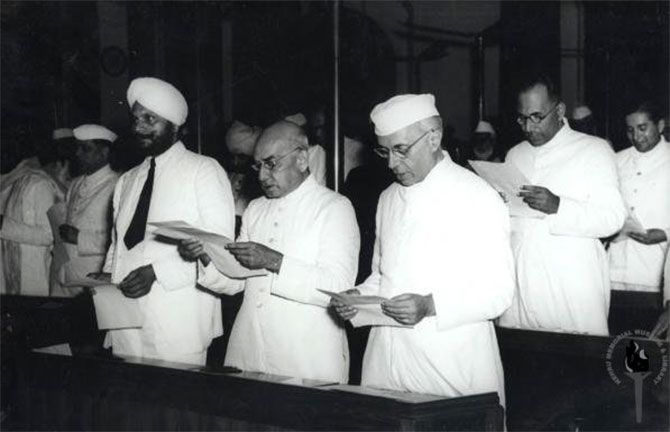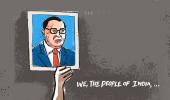'There are many things we need to work on.'
'At the heart of it is, one, the extent of inequality, which is not good for democracy and nation; two, a structural decline on how a country ought to function, how people should be held accountable, whose role is what.'
Tamil Nadu Minister Palanivel Thiagarajan delivered the annual commencement lecture at the School of Government and Public policy, Jindal Global University, recently. A Ganesh Nadar listened in, for this multi-part series.

Palanivel Thiagarajan is the information technology minister in Tamil Nadu, before which he was the state's finance minister.
A BTech, an MS, a PhD and an MBA, the last three from American universities, PTR, as he is popularly known, has worked in Lehmann Brothers and Standard Chartered Bank. It was after a long stint in the corporate world that he returned to his family calling, politics.
Institutions have their own culture that lasts as students and teachers come and go.
The idea of India a land of diversity, that you could carve out a country which has been ruled by many, take my part of the world.
Over different eras we were ruled by the Pandiyas, the Cholas, the Pallavas, the Vijayanagar Nayaks, the Muslims.
They had different kinds of models and different kind of governments.
If you take my city Madurai, it is one of the oldest living cities in the world, 2500 to 3000 years old.
There are 50 or 60 variants of this throughout the country.
One day in 1947, after various political back and forth, the borders were decided on various criteria. Not exclusively based on race, or language.
Bengali is spoken in both Bengal and Bangladesh; Urdu is spoken in various parts of North India and Pakistan.
Constitutional entities, at that time we did not have a Constitution, we had a notion of a Constitution in an Independent country.
In some ways at the beginning the idea of India is a miracle, a wonder, the fact that we were able to design, create a country from a colonial power before which we had thousands of years of history.
A history of great variants and yet we have sustained it for 75 years, a fact that is a miracle and a wonder.
It was not easy, most of you know that it took over two years to draft the Constitution.
There were debates in the Constituent Assembly before they arrived with a draft in November 1949 which was promulgated on January 26, 1950.
We now had states, against the 17 provinces that the British had ruled. In 1956 we had the reorganisation of states into 14 states and Union territories.
Today we have 29 states and 9 Union territories after the split of J&K.
We have a Constitution and the UK does not have written Constitution, the US has a Constitution for over 200 years and they have had 27 amendments.
We are 75 years old and we have had 175 amendments, among them 105 have been voted, approved and implemented.
That is fluid and what identifies India, what is India.
The basic structure of the Constitution, the Fundamental Rights which most of you will come across are unwavering. It has come under threat but most things in the Constitution cannot be changed no matter how many vote for it or take part in it.
There are inherent weaknesses in the Constitution. The first weakness is the necessity of a top-down structure.
They were trying to carve a nation out of hundreds of princely states, the provinces have great differences in language, culture, history and so on.
Though the Constitution says we are a Union of States it is very much centrally controlled, looking top-down.
There was no notion of a local body like a municipal or panchayat till the nineties' Panchayat Act.
We have evolved a lot in some ways much better than expected. At least the idea of India as a global political player, a macro-economic player, is now beyond doubt and an unquestionable success.

There are many things we need to work on. At the heart of it is, one, the extent of inequality, which is not good for democracy and nation; two, a structural decline on how a country ought to function, how people should be held accountable, whose role is what.
And finally, in consequence of the first two, a fall in public values and morality, there are some things we can do to improve that.
For me at the heart of democracy is equality, the equality of access, a level playing field, availability of information if you are in the market.
The core of democracy is what binds the free market and democracy together.
I want to talk about the notion of equality as a universal value. How that translates across countries, across cultures, across time.
Though it is a profound value, how difficult it is to attain at least in the United States which is a 200 year old country as opposed to a 50 year old country.
In the US the constitution adopted in 1789 says we hold the truth as inevitable that all men are created equal, that they are endowed by the creator with certain inalienable rights.
Among these are life, liberty and the pursuit of happiness.
This was a pioneering document at that time.
In reality there are already two problems here, it talks about only men and not women, and the second is that while the constitution was declared active, slavery was still in practice in the United States.
Ten years later you take that to Europe partly influenced by the Americans; there was a revolution in France.
A cry for liberty, equality, fraternity was the basis on which the revolution ran. Notice the commonality of equality as the core concept of it.
We march forward to our part of the country, in 1916 the Dravidian movement started with the Justice Party.
In 1929 the convergence of the movement of the Justice Party and the self-respect movement of EVR Periyar came together for a major conference in 1929 in Singapore.
It was a major conference for people like us for the major framework of the Dravidian movement.
'The aim and project of this self-respect movement is to aim and align a movement to remove concepts that creates discrimination between two human beings, creates divisions between different sections of society, the concept of inferiority or superiority on the basis of birth paves the way for the majority of people to be treated worse than cattle. That prevents the majority of people from entering temples.'
This is the problem of people in 1920. The aim of this movement is to give people equal rights, to create equality between people by natural justice and manmade laws.
To create requisite facilities for every single person to help in development to make all realise the duties towards the nation and learn about the rights enjoyed in the nation.
To raise the feeling of unity and solidarity among all the people and enable them to feel joy and sorrow.
It is over a hundred years after the French Revolution and the US constitution.
Let us now go to the document that we call the Constitution of India. I start with the preamble,
WE, THE PEOPLE OF INDIA, having solemnly resolved to constitute India into a SOVEREIGN SOCIALIST SECULAR DEMOCRATIC REPUBLIC and to secure to all its citizens:
JUSTICE, social, economic and political;
LIBERTY of thought, expression, belief, faith and worship;
EQUALITY of status and of opportunity;
and to promote among them all
FRATERNITY assuring the dignity of the individual and the unity and integrity of the Nation;

So here we are, 20 years after the self-respect conference and over 150 years after the US constitution.
As you know Dr B R Ambedkar, who was the leading light of the Constitution, he goes on to explain that the differences between people in Hindu society, to address the chronic problems is a part of the Constitution.
So in every way the universal values of human beings starts with equality and self-respect, the identity that all of us are born equal irrespective of caste, gender or religion.
You should get that right and move on from there. It is very hard to get that right because in the same country where the Constitution says that all men are born equal there are slaves.
180 years later in 1963 the civil right activist Martin Luther King, he hasn't realised it, he is still dreaming about it,
In August 1963 he says, 'I have a dream that one day my children will live in a nation where they will live and be judged not by the color of their skin but by their character.'
Though it is a universal concept and though it is transcends time, race, region and religion at some level it is very difficult to attain and getting it is the core principle of democracy.
Let us take various examples within India. In Tamil Nadu we have much better development and much better equality than other parts of the country.
I am making a mathematical statement, not a political statement.
Capital income is over Rs 3 lakh. 52% of our students are enrolled in colleges. 89% of 18 year old girls have passed out of school.
A majority of manufacturing is in Tamil Nadu, though we have only 6% of the population.
How did we get this far ahead? Because in 1921 the Justice Party legislated for compulsory primary education for boys and girls.
It was called a communal GO (government order) as it made sure that all communities had opportunity for ratio to jobs.
They legislated for giving women the right to vote before it was done anywhere else, even before the UK.
So you start with equality as the basis and then the formula becomes very, very clear.
Women are 50% of the population, if you don't give them enough opportunity, enough education, enough access to resources, you cannot have an equal society or a prosperous society. Everything starts with that.
If you do that right then the next generation is better educated than the last one.
You start with children, you make sure that every dollar goes into primary education, secondary education and skill development.
The core of democracy is how to focus on human capital development and the core of that starts with self-respect, equality, education, support from the State for health.
If we get that right, I think within India you will see data when you compare the capital income of Gujarat and Tamil Nadu it is the same maybe a little high.
50% of students are the age of 18 have not finished high school, we have to look into that situation, why are they not finishing high school? They are not coming back to school because they have not been given health support.
Why have they not been given enough health support? There is a social reason for that.
It will take a generation or two to progress to the right thing. But for that everybody has to be involved.
If the product development activity is not at the bottom of the pyramid then there is no stable society, therefore there is no full democracy.
If you look at the new world, the quality of relative civil society and the standards of life is very, very clear.
You take Western Europe, you take Australia, you take Singapore, you take Canada, it is very clear.
Those societies everybody has access, everybody has engagement and the bottom of the pyramid is protected.
You will find better quality of life, better economy and better development.
Transcribed by A Ganesh Nadar/Rediff.com
Feature Presentation: Rajesh Alva/Rediff.com










